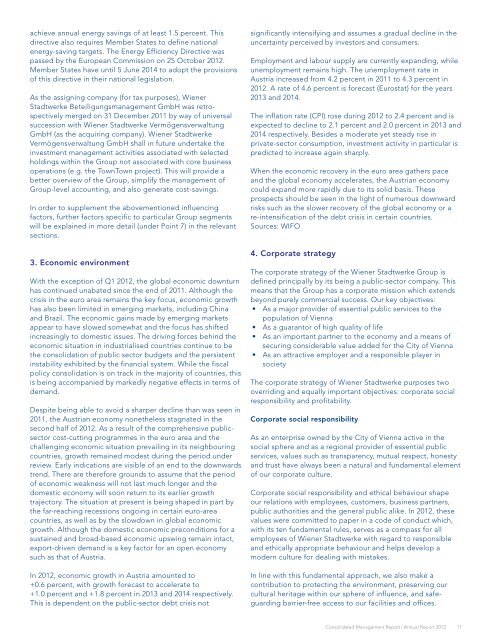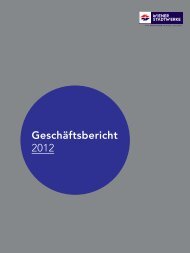Wiener Stadtwerke Annual Report 2012
You also want an ePaper? Increase the reach of your titles
YUMPU automatically turns print PDFs into web optimized ePapers that Google loves.
achieve annual energy savings of at least 1.5 percent. This<br />
directive also requires Member States to define national<br />
energy-saving targets. The Energy Efficiency Directive was<br />
passed by the European Commission on 25 October <strong>2012</strong>.<br />
Member States have until 5 June 2014 to adopt the provisions<br />
of this directive in their national legislation.<br />
As the assigning company (for tax purposes), <strong>Wiener</strong><br />
<strong>Stadtwerke</strong> Beteiligungsmanagement GmbH was retro-<br />
spectively merged on 31 December 2011 by way of universal<br />
succession with <strong>Wiener</strong> <strong>Stadtwerke</strong> Vermögensverwaltung<br />
GmbH (as the acquiring company). <strong>Wiener</strong> <strong>Stadtwerke</strong><br />
Vermögensverwaltung GmbH shall in future undertake the<br />
investment management activities associated with selected<br />
holdings within the Group not associated with core business<br />
operations (e.g. the TownTown project). This will provide a<br />
better overview of the Group, simplify the management of<br />
Group-level accounting, and also generate cost-savings.<br />
In order to supplement the abovementioned influencing<br />
factors, further factors specific to particular Group segments<br />
will be explained in more detail (under Point 7) in the relevant<br />
sections.<br />
3. Economic environment<br />
With the exception of Q1 <strong>2012</strong>, the global economic downturn<br />
has continued unabated since the end of 2011. Although the<br />
crisis in the euro area remains the key focus, economic growth<br />
has also been limited in emerging markets, including China<br />
and Brazil. The economic gains made by emerging markets<br />
appear to have slowed somewhat and the focus has shifted<br />
increasingly to domestic issues. The driving forces behind the<br />
economic situation in industrialised countries continue to be<br />
the consolidation of public sector budgets and the persistent<br />
instability exhibited by the financial system. While the fiscal<br />
policy consolidation is on track in the majority of countries, this<br />
is being accompanied by markedly negative effects in terms of<br />
demand.<br />
Despite being able to avoid a sharper decline than was seen in<br />
2011, the Austrian economy nonetheless stagnated in the<br />
second half of <strong>2012</strong>. As a result of the comprehensive public-<br />
sector cost-cutting programmes in the euro area and the<br />
challenging economic situation prevailing in its neighbouring<br />
countries, growth remained modest during the period under<br />
review. Early indications are visible of an end to the downwards<br />
trend. There are therefore grounds to assume that the period<br />
of economic weakness will not last much longer and the<br />
domestic economy will soon return to its earlier growth<br />
trajectory. The situation at present is being shaped in part by<br />
the far-reaching recessions ongoing in certain euro-area<br />
countries, as well as by the slowdown in global economic<br />
growth. Although the domestic economic preconditions for a<br />
sustained and broad-based economic upswing remain intact,<br />
export-driven demand is a key factor for an open economy<br />
such as that of Austria.<br />
In <strong>2012</strong>, economic growth in Austria amounted to<br />
+0.6 percent, with growth forecast to accelerate to<br />
+1.0 percent and +1.8 percent in 2013 and 2014 respectively.<br />
This is dependent on the public-sector debt crisis not<br />
significantly intensifying and assumes a gradual decline in the<br />
uncertainty perceived by investors and consumers.<br />
Employment and labour supply are currently expanding, while<br />
unemployment remains high. The unemployment rate in<br />
Austria increased from 4.2 percent in 2011 to 4.3 percent in<br />
<strong>2012</strong>. A rate of 4.6 percent is forecast (Eurostat) for the years<br />
2013 and 2014.<br />
The inflation rate (CPI) rose during <strong>2012</strong> to 2.4 percent and is<br />
expected to decline to 2.1 percent and 2.0 percent in 2013 and<br />
2014 respectively. Besides a moderate yet steady rise in<br />
private-sector consumption, investment activity in particular is<br />
predicted to increase again sharply.<br />
When the economic recovery in the euro area gathers pace<br />
and the global economy accelerates, the Austrian economy<br />
could expand more rapidly due to its solid basis. These<br />
prospects should be seen in the light of numerous downward<br />
risks such as the slower recovery of the global economy or a<br />
re-intensification of the debt crisis in certain countries.<br />
Sources: WIFO<br />
4. Corporate strategy<br />
The corporate strategy of the <strong>Wiener</strong> <strong>Stadtwerke</strong> Group is<br />
defined principally by its being a public-sector company. This<br />
means that the Group has a corporate mission which extends<br />
beyond purely commercial success. Our key objectives:<br />
• As a major provider of essential public services to the<br />
population of Vienna<br />
• As a guarantor of high quality of life<br />
• As an important partner to the economy and a means of<br />
securing considerable value added for the City of Vienna<br />
• As an attractive employer and a responsible player in<br />
society<br />
The corporate strategy of <strong>Wiener</strong> <strong>Stadtwerke</strong> purposes two<br />
overriding and equally important objectives: corporate social<br />
responsibility and profitability.<br />
Corporate social responsibility<br />
As an enterprise owned by the City of Vienna active in the<br />
social sphere and as a regional provider of essential public<br />
services, values such as transparency, mutual respect, honesty<br />
and trust have always been a natural and fundamental element<br />
of our corporate culture.<br />
Corporate social responsibility and ethical behaviour shape<br />
our relations with employees, customers, business partners,<br />
public authorities and the general public alike. In <strong>2012</strong>, these<br />
values were committed to paper in a code of conduct which,<br />
with its ten fundamental rules, serves as a compass for all<br />
employees of <strong>Wiener</strong> <strong>Stadtwerke</strong> with regard to responsible<br />
and ethically appropriate behaviour and helps develop a<br />
modern culture for dealing with mistakes.<br />
In line with this fundamental approach, we also make a<br />
contribution to protecting the environment, preserving our<br />
cultural heritage within our sphere of influence, and safe-<br />
guarding barrier-free access to our facilities and offices.<br />
Consolidated Management <strong>Report</strong> | <strong>Annual</strong> <strong>Report</strong> <strong>2012</strong><br />
11




